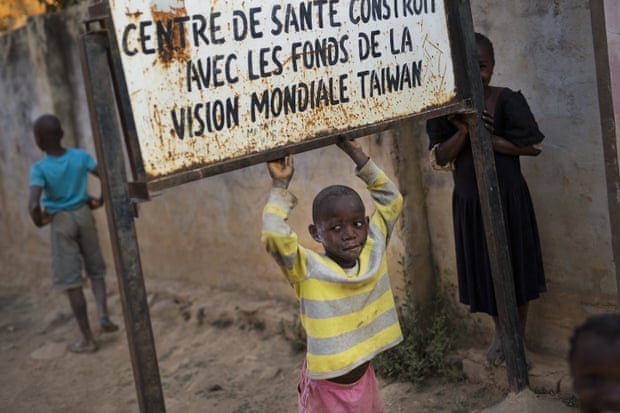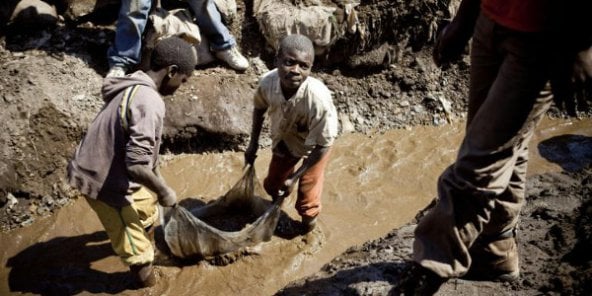Researchers link exposure to mining pollutants to greatly increased risk of conditions such as spina bifida and limb abnormalities
Thousands of people in the Democratic Republic of Congo (DRC) are being exposed to dangerous levels of toxic pollution that is causing birth defects in their children as they mine for cobalt used to make rechargeable batteries for smartphones, laptops and electric cars, a new medical study has found.

A child plays under a sign at the Mama Wa Mapendo clinic in Lubumbashi, DRC. A study has found children of miners in the area are at higher risk of birth defects. Photograph: Jérôme Delay/AP
Research published in the Lancet last week found that local people working in mines in the African “Copperbelt”, a mining region stretching across Zambia and the DRC, are at significantly higher risk of having children born with serious birth defects.
Researchers from the University of Lubumbashi in the DRC and the universities of Leuven and Ghent in Belgium compared 138 newborn children of families within the Copperbelt with 108 children born outside the mining zone in Lubumbashi. It found that the risk of birth defects greatly increased when a parent worked in a copper and cobalt mine.
The researchers linked the increased risk to the high levels of toxic pollution caused by the extraction of cobalt in southern Katanga, named one of the 10 most polluted areas in the world.
The study was commissioned after academics at the University of Leuven read reports from local doctors, NGOs and local authorities of high numbers of children of miners in the DRC being born with conditions such as limb abnormalities, cleft palates and neural tube defects such as spina bifida.
“This is the first study investigating the effects of mining-related pollution on newborns in sub-Saharan Africa and has shown that metal miners are indeed at increased risk of having a child with a birth defect,” said Dr. Daan Van Brusselen, a pediatrician at Ghent University who worked on the study alongside doctors in Belgium and the DRC.
“Although it’s still not clear how these birth defects arise, every day tens of thousands of workers are exposed to heavy work with a lot of pollutants and dust. The health of the miners and their families must be taken into account by anyone who profits from or uses cheap smartphones around the world,” he said.
Cobalt mined in the DRC accounts for 60% of global production of the mineral, which is essential to power rechargeable lithium batteries used in smartphones, tablets, electric cars, and laptops.
Pressure is growing on the multinationals who continue to source cobalt from the DRC to address the human rights and environmental abuses that have been uncovered in mines across the country
Earlier this year a lawsuit was launched in the US, which accused the world’s largest technology companies of aiding and abetting in the deaths of children working in mines in the DRC. The case is ongoing.
The original story was published in The Guardian

